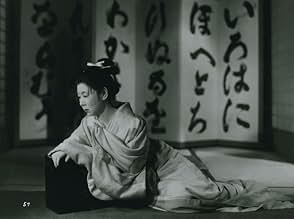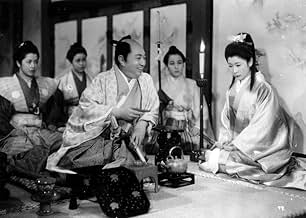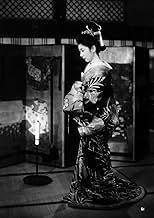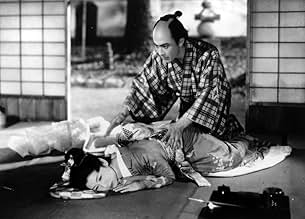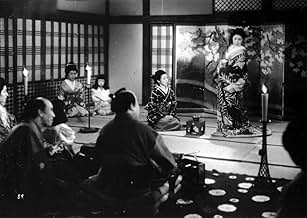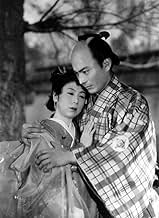IMDb-BEWERTUNG
8,1/10
8080
IHRE BEWERTUNG
Folgt dem Kampf und dem Überleben einer Frau inmitten der Wechselfälle des Lebens und der Grausamkeit der Gesellschaft.Folgt dem Kampf und dem Überleben einer Frau inmitten der Wechselfälle des Lebens und der Grausamkeit der Gesellschaft.Folgt dem Kampf und dem Überleben einer Frau inmitten der Wechselfälle des Lebens und der Grausamkeit der Gesellschaft.
- Regie
- Drehbuch
- Hauptbesetzung
- Auszeichnungen
- 2 Gewinne & 1 Nominierung insgesamt
Akira Oizumi
- Manager Bunkichi
- (as Hiroshi Oizumi)
Empfohlene Bewertungen
It was sickening to witness how Ohara was treated by the noble men of high rank and even by her father. She is a strong and proud woman, but she has a series of misfortunes of things she could not very well control herself. Because of her looks, her pride and her birth she is put, mostly by force, into various agreements that are disgrading and she meets little compassion.
That said, as this is based on a novel by Iharu Saikaku, it has strong tendencies towards being epic in approach. This is not a bad thing, but it takes on being a fairytale almost instead of gaining credibility like say 'Donzoko' by Kurosawa. For emotional impact Mizoguchi is an absolute master however and this tragic tale could not be outdone by any other.
That said, as this is based on a novel by Iharu Saikaku, it has strong tendencies towards being epic in approach. This is not a bad thing, but it takes on being a fairytale almost instead of gaining credibility like say 'Donzoko' by Kurosawa. For emotional impact Mizoguchi is an absolute master however and this tragic tale could not be outdone by any other.
Kenji Mizoguchi's stunning masterpiece is a heartbreaking tale of purity in a world of corruption. Based on a seventeenth-century novel by Saikaku Ihara called The Woman Who Loved Love, the film tells the story of Oharu, a young woman who in her younger days worked as a lady-in-waiting at the Imperial Palace of Kyoto, but having fallen in love with a man below her rank is expelled from the palace, and she and her parents are forced to live in exile. Try as she might to find love in her relationships, she is constantly thwarted by her society's low expectations for a woman's heart and her father's ambitions for respectability, and soon descends to being a concubine, later a streetwalking prostitute. Mizoguchi's tones are so gentle and poetic that every frame works its way into your heart, and in such a delicate manner. Kinuyo Tanaka's performance as Oharu is beautiful as well, abandoning the melodramatic gestures common to Japanese film acting and going straight for the heart. Sumptuous production design and a decidedly feminist message make a film well worth seeing.
'The Life of Oharu' is not an easy film to watch. There is barely even a fleeting moment of joy/happiness and towards the end, the viewer will find himself/herself getting really angry and outraged by the unthinkable oppression and atrocities and engulf our titular protagonist. Mizoguchi's sympathetic treatment of Oharu compels the viewer to feel beaten down and horrified by Oharu's miserable plight.
The long line of tragedies in Oharu's life gets triggered by her decision to fall in love with Katsunosuke(played by the legendary Toshirô Mifune), a man of lower social standing. This element of forbidden love was also present in the previous Mizoguchi film that I watched namely 'The Story of Last Chrysanthemum'. The story arc of Otoku in that film to a some extent resembles the arc of Oharu in this one in terms of the mental and physical torture that they are both subjected to. Oharu makes an effort to conform to society's deplorable expectations, but even then gets nothing to show for it and gets discarded. This is because once she falls in social standing and gets sold off by her family, she ceases to be a human being in the eyes of society. There is a lot of references to trade and business in 'The Life of Oharu' which is relevant because Oharu over the course of her life becomes nothing more than a commodity to be sold from one customer to the next in the patriarchal society of 17th century Japan.
Mizoguchi technical mastery is again on show in 'The Life of Oharu'. Some of the long takes and extended tracking shots are truly remarkable. Mizoguchi had the ability to suggest a plethora of things like passage of time, a change in mood, etc. with one little pan movement of the camera or with just the camera placement and those features are on show here too. The interior sets are beautifully designed and the haunting music by Ichirō Saitō is used craftily from time to time to set/change the mood. Kinuyo Tanaka has to be admired for lending the sympathy inducing tender innocence to Oharu. Her performance in the scenes depicting the later stages of Oharu's life is jaw-dropping in its authenticity and humanity.
To conclude, I have to reiterate that 'The Life of Oharu' is not for everyone. One has to be in a specific mood to be able to endure the emotionally crushing narrative and storytelling of the film. But having said that, I still believe that it needs to be watched as Oharu represents numerous women(of Japan and beyond) in history and present times whose lives were and are still getting destroyed due to an oppressive society which denigrates women. It is said that Mizoguchi's obsession with capturing the misery of women in the face of oppression had its roots in his own childhood as his own sister who raised him was sold by their father. One can sense a personal grief, a personal intimacy in the style of storytelling in this particular film. Highly Recommended.
The long line of tragedies in Oharu's life gets triggered by her decision to fall in love with Katsunosuke(played by the legendary Toshirô Mifune), a man of lower social standing. This element of forbidden love was also present in the previous Mizoguchi film that I watched namely 'The Story of Last Chrysanthemum'. The story arc of Otoku in that film to a some extent resembles the arc of Oharu in this one in terms of the mental and physical torture that they are both subjected to. Oharu makes an effort to conform to society's deplorable expectations, but even then gets nothing to show for it and gets discarded. This is because once she falls in social standing and gets sold off by her family, she ceases to be a human being in the eyes of society. There is a lot of references to trade and business in 'The Life of Oharu' which is relevant because Oharu over the course of her life becomes nothing more than a commodity to be sold from one customer to the next in the patriarchal society of 17th century Japan.
Mizoguchi technical mastery is again on show in 'The Life of Oharu'. Some of the long takes and extended tracking shots are truly remarkable. Mizoguchi had the ability to suggest a plethora of things like passage of time, a change in mood, etc. with one little pan movement of the camera or with just the camera placement and those features are on show here too. The interior sets are beautifully designed and the haunting music by Ichirō Saitō is used craftily from time to time to set/change the mood. Kinuyo Tanaka has to be admired for lending the sympathy inducing tender innocence to Oharu. Her performance in the scenes depicting the later stages of Oharu's life is jaw-dropping in its authenticity and humanity.
To conclude, I have to reiterate that 'The Life of Oharu' is not for everyone. One has to be in a specific mood to be able to endure the emotionally crushing narrative and storytelling of the film. But having said that, I still believe that it needs to be watched as Oharu represents numerous women(of Japan and beyond) in history and present times whose lives were and are still getting destroyed due to an oppressive society which denigrates women. It is said that Mizoguchi's obsession with capturing the misery of women in the face of oppression had its roots in his own childhood as his own sister who raised him was sold by their father. One can sense a personal grief, a personal intimacy in the style of storytelling in this particular film. Highly Recommended.
Mizoguchi's empathy for female characters is legendary. The Life of Oharu is one outstanding example. One woman's journey from member of the imperial court to elderly streetwalker is narrated in exquisite, shimmering, painful style. Oharu (Kinuyo Tanaka) is seduced by a man below her station. Her crime is to love the man back unreservedly. That action becomes the catalyst for a series of degradations punctuated by false dawns, as Oharu's life spirals to rock bottom. And as bleak and depressing as that sounds, Mizoguchi's storytelling, combined with Tanaka's dignified portrayal, make this film cathartic, a tragedy with a small, life-affirming message at its heart. It is a cautionary tale to the follies of social mores, and the burden that women through the ages have to endure. More than that, it is a tale of one woman's dignity through the most humiliating of circumstances. Stunning.
10rbiko-1
I cannot agree with the reviewer who commented that Mizoguchi does not have the aesthetic sensibility of Kurosawa or Ozu. In fact, he appears to me to be the true master of Japanese cinema. 'Oharu' is a marvellous achievement - a compassionate, beautiful account of a quite astonishing fall from privilege and grace into destitution and despair. It is unremittingly bleak and yet due to Mizoguchi's genius and Kinuyo Tanaka's luminous portrayal of the unlucky Oharu, it is a spiritually compelling work, with sheer artistry and simple human empathy competing for our attention in every take. Breathtaking film-making of the highest quality.
Wusstest du schon
- WissenswertesThis film, which was director Kenji Mizoguchi's dream project, was severely under-financed, and the production was forced to use a warehouse instead of a regular sound stage. This warehouse happened to be located near railways, and each time a train passed by, they had to stop shooting, which made the shooting of the film even more difficult with the director's obsessive use of long, continuous, uninterrupted takes. The same warehouse was also used for Josef Von Sternberg's film 'The Saga of Anatahan'.
- Zitate
Katsunosuke: Lady Oharu, a human being - no, woman - can only be happy if she marries for love. Rank and money don't mean happiness.
- Crazy CreditsOpening credits shown over Japanese artwork/water-colors.
- VerbindungenFeatured in Die geheimnisvolle Sekte (1978)
Top-Auswahl
Melde dich zum Bewerten an und greife auf die Watchlist für personalisierte Empfehlungen zu.
- How long is The Life of Oharu?Powered by Alexa
Details
Box Office
- Weltweiter Bruttoertrag
- 6.921 $
- Laufzeit
- 2 Std. 28 Min.(148 min)
- Farbe
- Sound-Mix
- Seitenverhältnis
- 1.37 : 1
Zu dieser Seite beitragen
Bearbeitung vorschlagen oder fehlenden Inhalt hinzufügen

